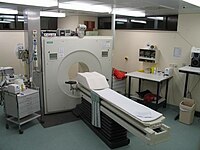
Photo from wikipedia
In the recent years, there has been a clear shift toward increased utilization of cardiac positron emission tomography (PET) in myocardial perfusion imaging (MPI). This is seen in both the… Click to show full abstract
In the recent years, there has been a clear shift toward increased utilization of cardiac positron emission tomography (PET) in myocardial perfusion imaging (MPI). This is seen in both the academic and private sectors. It is in part due to limited diagnostic accuracy of SPECT in the real world. Recent data suggested that SPECT performance outside clinical studies is limited by decreased specificity. PET MPI has been shown to have enhanced diagnostic accuracy in comparison to other imaging modalities. In the recent PACIFIC trial, cardiac PET had the highest accuracy and overall area under the curve when compared to other modalities using invasive hemodynamic assessment as the reference standard. On the other hand, PET is not free from artifacts. In the current era, most laboratories are utilizing hybrid systems which include PET and computed tomography (PET CT). In the systems, PET CT procedures may be prone to misregistration artifacts, a major reason for false positivity in PET MPI. In addition, Rubidium is the most commonly utilized radiopharmaceutical in the current era. It is preferred in high volume centers as well as in sites that does not have a cyclotron onsite. Rubidium is produced from a Strontium/Rubidium generator and is eluted every 10 minutes. Rubidium is an analog of potassium and requires active transport via the sodium/potassium adenosine triphosphate transporter. In addition to cardiac uptake, there is significant uptake in the stomach, spleen and colon (Figure 1A, B). It is estimated that a small but non-negligible fraction of Rubidium PET MPI studies (* 10%) suffer from high levels of tracer uptake in structures adjacent to the heart which may impact the interpretability of the MPI study. Identifying factors that increase the extracardiac uptake in the stomach, spleen and colon is very important to avoid having non-diagnostic studies. In another shift in medicine, proton pump inhibitors (PPI) are frequently utilized for gastric symptoms. They are available over the counter and do not require a physician prescription. Many patients utilize these medications daily. However, there have been several reports in the recent years questioning the safety of their chronic use. The association between PPI use and infection, particularly Clostridium difficile and pneumonia, has been the subject of several studies. In addition, one study suggested that long-term PPI use increases the risk of dementia. On the other hand, observational studies suggested that PPIs are associated with an increased gastric cancer risk. These concerns have not been confirmed in randomized controlled trials. Many other less concerning side effects have been reported from PPI chronic use. However, the interaction between PPI use and MPI accuracy has not been evaluated before. In this issue of the Journal, Alzahrani et al. performed an interesting prospective study evaluating the relationship between Rubidium gastric uptake and the use of PPIs. In 600 patients who underwent clinically indicated Rubidium PET MPI studies, the use of PPI use was prospectively ascertained (medication, dose, frequency and duration of use, and time of last dose). Absolute uptake values and gastric:hepatic ratios were compared in PPI and non-PPI users. The authors found that the gastric uptake of Rubidium was much greater Reprint requests: Mouaz H. Al-Mallah, MS, MSc, Houston Methodist Hospital, Houston Methodist DeBakey Heart & Vascular Center, 6500 Fannin Street, Smith-18, Houston, TX 77030; [email protected] J Nucl Cardiol 2020;27:1452–5. 1071-3581/$34.00 Copyright 2020 American Society of Nuclear Cardiology.
Journal Title: Journal of Nuclear Cardiology
Year Published: 2020
Link to full text (if available)
Share on Social Media: Sign Up to like & get
recommendations!